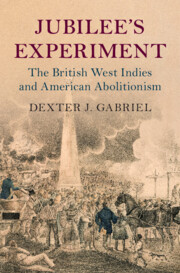Book contents
- Jubilee’s Experiment
- Slaveries since Emancipation
- Jubilee’s Experiment
- Copyright page
- Dedication
- Contents
- Figures
- Acknowledgments
- Introduction
- 1 The Anxieties of Emancipation
- 2 Fears of British Emancipation in America
- 3 The Benefits of Free Labor
- 4 The Problems of Apprenticeship
- 5 The Experiment and Its Challenges
- 6 Reform and the Experiment
- 7 African Americans and British Emancipation
- 8 A West Indian Jubilee in America
- Epilogue
- Index
6 - Reform and the Experiment
Published online by Cambridge University Press: 30 March 2023
- Jubilee’s Experiment
- Slaveries since Emancipation
- Jubilee’s Experiment
- Copyright page
- Dedication
- Contents
- Figures
- Acknowledgments
- Introduction
- 1 The Anxieties of Emancipation
- 2 Fears of British Emancipation in America
- 3 The Benefits of Free Labor
- 4 The Problems of Apprenticeship
- 5 The Experiment and Its Challenges
- 6 Reform and the Experiment
- 7 African Americans and British Emancipation
- 8 A West Indian Jubilee in America
- Epilogue
- Index
Summary
The chapter traces the project of reforming the Anglo-West Indies from early missionary efforts through the post-emancipation. Abolitionists’ assessments of moral reform in the British colonies served as a compelling argument of the experiment’s success. In the United States, influenced by the Great Awakening, morality, religious instruction, education, and spiritual uplift were appealing indicators on the success or failure of emancipation. Some American reformers journeyed to the West Indies to take part in this “civilizing mission.” But as I argue, freedpeople had their own perceptions of moral behavior, challenging the expectations of reformers in both England and America.
Keywords
- Type
- Chapter
- Information
- Jubilee's ExperimentThe British West Indies and American Abolitionism, pp. 195 - 237Publisher: Cambridge University PressPrint publication year: 2023

